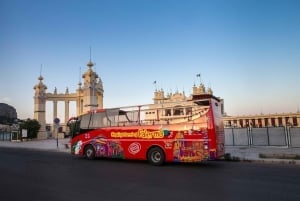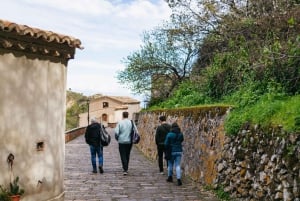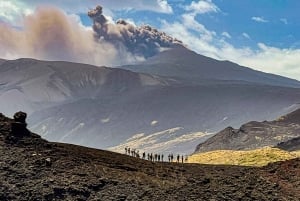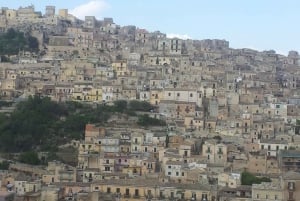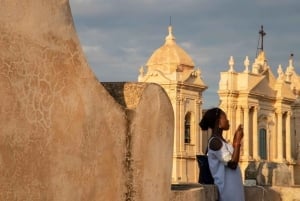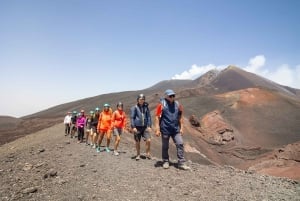Sicily Travel Tips from A - Z
Communication: Learning at least some basic Italian words and phrases comes in handy when travelling to Sicily. Sicilians are a bit reserved when it comes to foreigners, which is understandable seeing their long history of invasions – and the modern invaders are we, the travellers. Not many people speak English except in big hotels and airports. French and German are more common, as many Sicilians have been working in Germany, Switzerland or France and younger people grew up there. Even if you do speak Italian you might not understand every word, since Sicilians are speaking their local language. But they all speak Italian and will appreciate you making the effort to talk in Italian. The effect: prices on markets will miraculously go down and in small trattorias away from tourist resorts it can happen that you will be invited to taste some of their specialties or for a bottle of wine.
Credit Cards: Most restaurants and shops accept credit cards, Visa and Mastercard are the most widele accepted, fewer accept American Express. Driving over land you will still find restaurants and shops where only cash is accepted, especially in small villages.
Currency Exchange: Currency in Italy is the euro (€). Banks do not exchange large amounts of currency, transactions are usually limited to € 400 at a time. You can check the current exchange rates here
Dining: The main meal of the day is lunch, which is usually served around 13.00 h. Dinner starts around 19.00 h, although Italians eat later. You can expect everywhere, also in small trattorias, very good wines, but few restaurants in Sicily serve poultry. Roasted chicken is mainly sold as a take-away meal, so if you find it on a menu you can be sure that it is for tourists. Pizza is a typical evening food, and Italians drink cappuccino only in the morning. Ordering a cappuccino after a meal will unmask you immediately as a tourist.
Dress Codes: While on the beach nearly everything goes (except topless), when leaving the beach Italians put on a t-shirt, shorts or skirt, and shoes. For them beachwear belongs – as the word indicates – to the beach.
In all churches, big or small, you have to cover your shoulders and knees, also men should wear long pants.
In the evening Italians dress up – they have to make „bella figura”, in particular when they go dancing.
Driving in Sicily is admittedly a challenge, but please think of the thousands of tourists who drove around in Sicily by themselves, so you can do it, too! The interested reader finds detailed information, including the "Science of Proper Parking" and the "Ten Commandments of Driving in Sicily" at our page Driving in Sicily
Opening Hours: Shops and offices open at 09.00h in the morning, close from 13.00h to 16.00h/17.00h, and are open again until 19.00h/20.00h. Shops in tourist resorts can be open in summer until 22.00h and later.
Pets: We also have pets and know how it feels when you have to leave them at home, because most hotels accept only small pets up to 6 kg – if they accept them at all. But there are also other things to think about. Your furry family member will need a vaccination passport and it is also useful to have an extra document of your vet that it doesn’t have rabies. Leishmaniosis is a typical dog-illness around the Med, so make sure when you are here that your dog doesn’t get in contact with stray dogs. There are time limits for vaccinations, so please inform yourself in time at your Official Veterinarian.
Please keep in mind that pets over 6 kg are not allowed in the cabin and have to travel in a pet box in the cargo department of the airplane. On long distance flights also small pets are not allowed in the cabin. That is very stressy for an animal, and if you plan a short stay of only some days or a week it may be better to find a pet-sitter at home. The same is valid for winter holidays, except you plan a long term stay. Your pet will already have its winter fur, and, coming to a place with spring like climate like in Sicily, will lose it (and the other way round when you’ll be back).
Safety: Women should carry small purses, no big handbags. In cities walk on the side against the traffic. If this is not possible carry your purse on the side away from the traffic. In crowded areas or buses rucksacks should be carried and not be worn on the back. More informations for Health and Safety you will find here.
Shopping: Always ask for a ricevuta or scontrino (receipt), also on markets, and in every restaurant or bar. If the financial police controls - and they do! - and you cannot prove that you have payed and the amount has been registered - the fines can be high, very high. If you get caught buying a copy of a brand on the market or at a street vendor, you and the vendor could be charged up to € 10.000. Have a look at our Shopping Tips and find shops here
Smoking is prohibited since 2005 in any buildings open to the public, including hotels, shops, restaurants, airports and offices.
Tip: 5-10% in restaurants, room maid/boy € 1 per day per person, porter (in case your hotel has one...) € 1-2 per piece of luggage.
Tourist Tax: Since some years many Italian regions and cities tax hotel stays. The residence or tourist tax is a tax on consumers. Each local authority decides its own rate of tax and some make no charge at all. There is no precise rule and every authority applies the regulations as it sees fit, so the amount of tax and any exemptions vary - difficult to explain not only to Italian tourists but even more to foreigners. The billing, including in hotel and trip rates, or collection of the city tax by travel agents or tour operators is prohibited by law. You may be charged € 1,50 - € 5 per day by your accommodation at check-out, usually for a maximum of 10 days. Children under 18 years, travellers over 65 years and disabled people may be charged or not.
The tax amount depends on the hotel category, city and the location and it may change without notice. The money is collected by the accommodation provider, but paid over to the relevant local authority.
Visa: EU citizens do not need a visa, only an ID-Card or passport. Visitors from the USA, Canada, Japan and Australia can visit Italy for up to three months without a visa, they need a passport that is valid for the entire stay. Visitors of other countries should contact the nearest Italian Consulate or check the website of the Italian Foreign Ministry.
Tips for light travelling you'll find here


